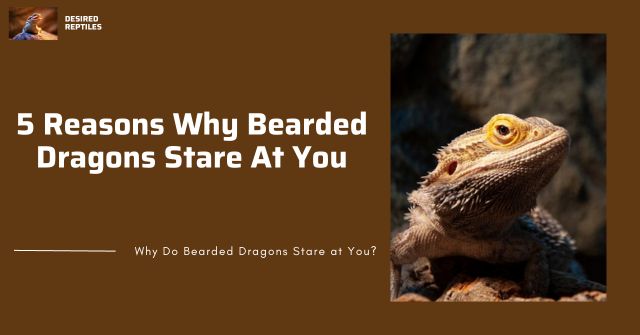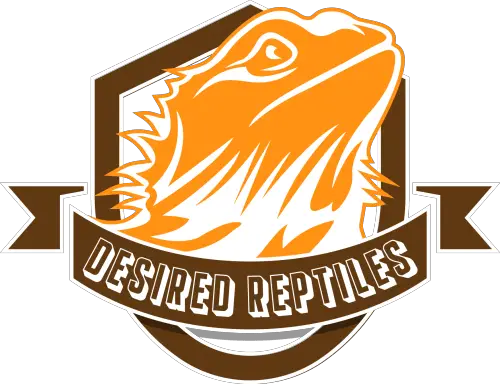Bearded dragons are unique creatures, and caring for one offers exciting and rewarding experiences as you bond together. One of their most charming traits is their curiosity, often staring at anything that catches their interest. If you have a simple trick to practice, your bearded dragon will likely be the perfect audience. If you’re wondering why your beardie is staring at you, you’ve come to the right discussion to find out.
Your bearded dragon may be staring at you because it thinks you have food. It could also be because you look different, perhaps when you wear catchy colors like greens or blues. Beardies are easily entertained by varying patterns or even their own whims. Since they’re also individualistic, what captivates one bearded dragon may differ entirely from another.
By the end of this article, you’ll gain a clearer understanding of why your bearded dragon is so focused on you.
How Well Can Bearded Dragons See?
Contrary to common belief, bearded dragons have surprisingly good eyesight. They are tetrachromatic, meaning they possess four color receptors, which allows them to perceive a wider range of colors. In comparison, humans only have three.
Additionally, bearded dragons can see ultraviolet (UV) light, which helps them hunt in the wild. Their vision allows them to spot objects from great distances. However, they struggle with depth perception, particularly when items are placed directly in front of them. This limitation can lead to incidents where your dragon might bump into walls or fall from heights, as they do not fully grasp the concept of distance.
With such sharp eyesight, staring at objects or people can be entertaining for bearded dragons.

Five Reasons Why Your Bearded Dragon Stares at You
Your pet beardie may be staring at you for the following reasons:
1. Your Beardie Is Curious
Bearded dragons are highly intelligent and naturally curious creatures. They are attracted to movement, bright colors, or unusual shapes. If you’ve changed your hairstyle or are wearing a new outfit, your beardie might be trying to figure out what it’s seeing.
2. Your Beardie May Be Hungry
Bearded dragons can form strong bonds with their owners, recognizing their voice, scent, and appearance. When you approach, your pet may associate you with food and stare intently, hoping you’ll offer some treats.
3. Your Beardie Might Be Terrified
If your beardie is new to its environment, it may feel anxious. These animals are observant and need to stay aware of their surroundings to avoid potential threats. If you move around, your beardie might be cautiously assessing whether you pose a danger, leading to a stare that suggests it finds the situation unsettling.
4. Your Beardie Enjoys Your Company
On the flip side, your beardie might be staring because it enjoys your presence. If you regularly bond with your pet, it may get excited to see you. If your bearded dragon is friendly, it might display its affection by licking you, running toward you when you enter the room, allowing you to pick it up easily, or snuggling against you.
5. Your Beardie May Be Showing Aggression
Eye contact can also indicate dominance among bearded dragons. If your pet feels threatened or annoyed, it may hold your gaze and exhibit behaviors like head bobbing, foot stomping, darkening its beard, or thrashing its tail. These signals suggest it’s time to give your beardie some space. If your pet is unwell, approach it calmly to prevent escalating the situation.
Effective Ways to Make Your Bearded Dragon Relax Around You
While beardies often stare out of curiosity, there’s every possibility that it could be stressed. Here are some tips to help it feel more comfortable and relaxed:
Use Treats to Appease Your Pet
Bearded dragons enjoy treats, which can help improve their mood. Offer your beardie delicious options like blueberries or hornworms alongside its healthy meals. Hand-feeding these treats can build trust between you and your pet.
Caution: While treats are enjoyable, they should be offered sparingly. Too many can lead to health issues, similar to how excess candy affects humans.
Handle Your Pet with Care
Respect is essential, even when handling pets. Avoid poking, prodding, or picking up your dragon if it shows signs of discomfort. Always give your beardie space when it feels stressed to prevent developing negative associations with your presence.
Spend Quality Time Together
To help your dragon relax around you, dedicate time each day to interact with it. Hand-feed treats accordingly and, if your pet allows, gently stroke it.
Although bearded dragons are generally solitary, they appreciate limited interaction, which can stimulate their interest and engagement. As long as you are calm and non-threatening, you can cultivate a strong bond with your beardie.
Common Rookie Mistakes With Pet Bearded Dragons
It’s common to make mistakes when caring for your first bearded dragon. However, some of them can have serious consequences for your pet. Many mistakes arise from misinformation or a lack of knowledge, which is why it’s crucial to learn as much as possible about bearded dragons before adopting one.
By educating ourselves, we can avoid the following mistakes and their consequences:
| Common Bearded Dragon Mistakes | Consequences |
|---|---|
| Picking it up with the limbs | Can cause injury or dislocation |
| Holding by its tail | May injure the tail and lead to stress or anxiety |
| Helping it to shed its skin | Can cause micro tears on the skin |
| Overfeeding your pet | Can lead to obesity and choosiness |
| Feeding it too many treats | Can be nutritionally insufficient |
| Holding it for long hours outside its enclosure | May lead to lethargy from limited basking hours |
| Playing loud sounds close to your beardie | Can cause stress and anxiety |
| Spraying insecticide or perfume around your pet’s enclosure | May cause respiratory problems |
How Can I Tell If My Bearded Dragon Is Uncomfortable?
Bearded dragons can communicate their discomfort by behaving in rather weird, specific ways. For example, beardies may glass surf when they’re bored or too hot, hide or sleep excessively when they’re too cold, and display black-bearding when they feel even slightly uncomfortable.
The table below explains more of these signs of discomfort and what they mean:
| Signs | Meaning |
|---|---|
| Lethargy | Possible illness or discomfort |
| Glass surfing | Boredom or overheating |
| Lack of appetite | Stress, illness, or environmental issues |
| Hiding habits | Feeling too cold or insecure |
| Sudden aggression | Stress, fear, or discomfort |
| Hissing | Warning or irritation |
| Pacing | Stress or anxiety |
| Waving | Sign of submission |
| Restlessness even at night | Stress or discomfort |
| Staring at objects for long | Hunting behavior or boredom |
| Weight loss | Illness or inadequate diet |
| Darkening of the beard and underbelly | Stress, illness, or temperature regulation |
| Head bobbing | Communication or dominance display |
